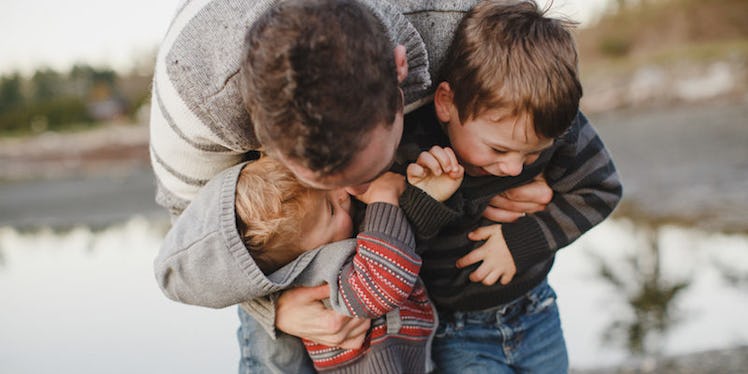
Here's How To Teach Kids To Be Accepting In A Few Simple Steps
I'm a Millennial dad. My wife and I have had many teaching moments with our son over the course of the last seven years. But one of the most important things he could ever learn from us is the acceptance of others.
Fortunately, for a child his age this lesson isn't that hard to comprehend. Children aren't born as bigots -- it's a trait that is learned. As parents, it's our responsibility to ensure his attitudes toward his peers are based on their character traits and not their identities.
The best way we teach our son is through keeping our ears open for cues, and to understand that sometimes what a child says and what they fundamentally believe isn't congruent.
When our son laughed at seeing a man kissing another man, it wasn't because he's a hateful person. It's because he hadn't seen that depicted anywhere else before -- there aren't many children's movies showing same-sex love interests, after all.
But when we explained to him that, yes, a man can love another man the same way his parents love each other, and there's nothing wrong with that, he gets it. He doesn't laugh anymore -- he really pays no attention to it, just as he wouldn't with a straight couple kissing.
Teaching acceptance to a kid isn't hard. Knowing when to teach these types of lessons is the important part.
It happened another time when my son received a kitchen place-mat as a gift from a relative. This place-mat had pictures of every president from Washington to Obama. Clearly, one stood out among the sea of white faces.
My son asked, “Why is only one president black?” And it was important to explain that, in the history of our nation, black people weren't treated fairly. I explained that even to this day they aren't given fair treatment.
That really hit him hard. “That's not fair!” he said. And I agreed with him. No, it wasn't fair, and that a lot of people were working hard to change that.
My son replied,
If I had a time machine, I'd go back and tell those people to change things!
That sentiment made my heart melt. It showed that I was teaching my son the right things. But there are times when he will say something that's completely startling.
Like the time he told me he wanted a boy president instead of a girl one. I asked him, “Does it matter so much if the next president is a boy or a girl? Shouldn't we worry about what they'll do as president instead?”
He took a moment to think about this. And then, like a light switch turning on, he understood. “I guess the president can be a girl, as long as she's nice and does the right things for people,” he replied.
Kids are sponges. They absorb every little detail about the world around them. My son is no exception -- even when we think we're quiet enough, or that he's distracted by technology, his ears are wide open.
If children are exposed to positive elements -- if they are shown examples in our media that showcase acceptance of cultures, lifestyles and gender equality -- then they will exhibit those traits almost automatically. But you'll also have to play a role, too, in talking about those positive role models in your everyday conversation.
The part you as a parent must play is an active listener. Keep an eye out for cues, and pay close attention to what your child is saying. Understand that teaching moments are out there, and that your child is eager to learn from you.
When my son was born, I was scared about my ability to raise him as an individual who would be accepting of others. My wife and I still play an active role in showcasing positive people from other cultures and lifestyles.
But for the most part, your child is a reflection of your own character traits and outward behavior. Showcase tolerance toward others, and they'll likely do the same. It's that easy.